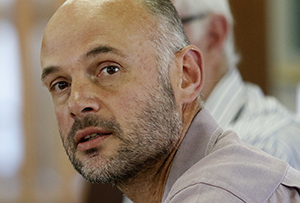Latest News Archive
Please select Category, Year, and then Month to display items
10 March 2022
|
Story Anthony Mthembu
|
Photo Unsplash
 The No Student Hungry team gearing up to start distributing food parcels to the selected students.
The No Student Hungry team gearing up to start distributing food parcels to the selected students.
The UFS is one of the many institutions of higher learning where food insecurity is an active issue. However, the
No Student Hungry Programme is one of the initiatives launched at the university to assist in fighting food insecurity at the institution.
The purpose of the programme
Since its inception in 2011, the initiative has assisted many students in acquiring a healthy meal. Additionally, the Food Environment Office also hands out food packages, so that students can continue to achieve academically. “We are trying to develop a healthy environment for students and make it easier for them to have a nice and healthy meal,” stated Annelize Visagie, who heads the Food Environment Office at the UFS. The Food Environment programme is spread out on all three campuses, each with its own facilitators. Furthermore, the programme mainly caters for students who are not funded by the National Student Financial Aid Scheme (NSFAS) but who are excelling academically. The abovementioned students apply for assistance online, and a list is then drawn up of students who receive assistance for the year.
Alternative solutions to keep the initiative running
On the Bloemfontein Campus, the No Student Hungry Programme will be catering for 200 students in the 2022 academic year, assisting them with a daily nutritious meal. Additional food parcels are also handed out to provide further assistance. “We give food parcels to the students on the list every Tuesday and Thursday at the Thakaneng Bridge,” Visagie highlighted. However, she argues that catering for the student population through this programme can be a challenge, as the demand for assistance is growing rapidly and the ability to assist is limited. The programme relies on partnerships and sponsors to assist the student body. In fact, the coordinators of the programme currently have a memorandum of understanding with Tiger Brands according to which they deliver around 100 food parcels for distribution.
In addition, the coordinators have put in place alternative measures to ensure that they can provide more food to students. “The
Kovsie Act Office, in partnership with the
Department of Sustainable Food Systems and Development, has started a food garden where healthy and nutritious produce are grown, in order to add value to the distribution,” she indicated. Although the programme can only assist to a point, students who are in desperate need of assistance are never turned away. In fact, the
Social Support Unit at Thakaneng Bridge usually assists students with food vouchers for a maximum of four days.
A commitment to teaching healthy eating habits
The programme is not only committed to curbing food insecurity, but also to ensuring that students have a healthy and balanced diet. As such, a booklet is being issued by the
Department of Nutrition and Dietetics in collaboration with the Department of Sustainable Food Systems and Development, which contains ways in which students can make a healthy meal using some of the ingredients offered in the food parcels.
“We want to teach students how to eat healthy in the cheapest way, because they don’t have a lot of money to buy expensive food products,” Visagie argued.
Lecturer’s debut novel wins ATKV Prize for Fiction
2015-10-14

Dr Francois Smith
Photo: Johan Roux |
Kamphoer made its debut on the literary scene just over a year ago, and on 11 September 2015, it was declared the best novel by the Afrikaanse Taal en Kultuurvereniging (ATKV). This is not the first time Kamphoer has been recognised as literary gem. Earlier this year, the novel was shortlisted for the W A Hofmeyr Prize as well as the Huisgenoot Tempo Award.
Dr Francois Smith, the author, joined the University of the Free State (UFS) as a lecturer in the Department of Afrikaans and Dutch, German and French at the beginning of this year. Prior to entering the academic sphere, he dedicated about 11 years of his life to editing for a publishing house. Certainly, helping other people write and produce books thoroughly prepared him for authorship.
For three months, Smith spent eight hours a day creating his award-winning masterpiece. The secret of success lies in the ABC formula. “The ABC for writing is Apply Back to Chair. You have to go and sit down and start typing,” he says.
That is when passion meets imagination, albeit at times, one might also need inspiration. Smith applied this winning formula meticulously, and it has resulted in over 30 000 copies of Kamphoer being sold since July 2014.
He was taken aback by the novel’s warm reception. “I wrote a book, finished it, and knew that it wasn’t bad but I never for one moment imagined that it would be such a big commercial success,” he said.
About Kamphoer
The book which Smith describes as a good but not an easy read about a disturbing subject is the true story of a woman who was brutally raped during the South African War and left for dead. After the traumatic experience, she dedicates her life to helping others deal with similar ordeals, re-encountering her rapists in the process.
About the award
Kamphoer emerged as an exceptional contribution amongst two other finalists. Kerneels Breytenbach’s Ester as well as Harry Kalmer’s ’n Duisend stories oor Johannesburg were also competing for the prestigious award.